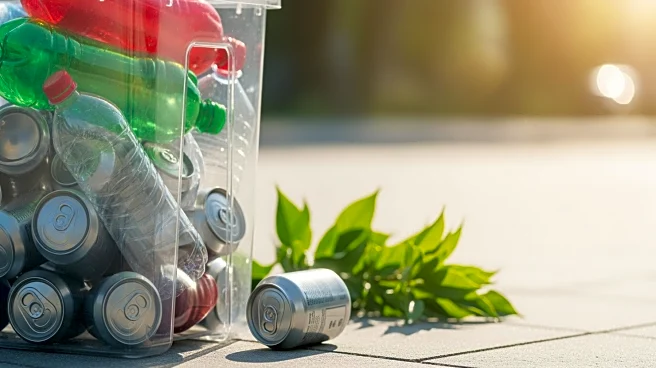What's Happening?
Coca-Cola Europacific Partners (CCEP) has reported a significant increase in recycling activity following a five-week trial at New College Lanarkshire. The initiative, conducted in collaboration with environmental
charity Keep Scotland Beautiful, involved the use of Reverse Vending Machines (RVMs) on campus, incentivizing students with a 20p reward for each container recycled. During the trial, students returned over 20,000 cans and plastic bottles, a substantial rise from the previous year's 255 containers. The trial demonstrated the effectiveness of financial incentives in promoting recycling, as evidenced by the 80% redemption rate of issued vouchers. However, once the incentive ended, recycling rates dropped by 91%, underscoring the impact of financial rewards on recycling habits.
Why It's Important?
The trial's success highlights the potential of incentive-based recycling schemes to significantly boost recycling rates, which is crucial for environmental sustainability efforts. The findings are particularly relevant as the UK prepares to implement a nationwide Deposit Return Scheme (DRS) in 2027. By understanding the behavioral impact of financial incentives, CCEP and other stakeholders can better design and promote recycling initiatives that encourage public participation. This approach not only supports environmental goals but also aligns with broader sustainability objectives, potentially influencing policy and corporate strategies in the beverage industry.
What's Next?
The insights gained from this trial will inform the development and implementation of the UK's forthcoming Deposit Return Scheme. Stakeholders, including CCEP and environmental organizations, are likely to advocate for similar incentive structures to maximize public engagement and recycling rates. As the DRS rollout approaches, further studies and trials may be conducted to refine strategies and ensure effective public communication and participation. The trial also suggests that consistent messaging and clear incentives will be critical in preparing the public for the DRS, potentially leading to broader adoption of sustainable practices.
Beyond the Headlines
The trial underscores the importance of behavioral economics in environmental policy, demonstrating how small financial incentives can drive significant changes in public behavior. This approach could be applied to other areas of sustainability, encouraging individuals and communities to adopt environmentally friendly practices. Additionally, the trial highlights the role of educational institutions in fostering environmental awareness and action among young people, who are key stakeholders in future sustainability efforts.











